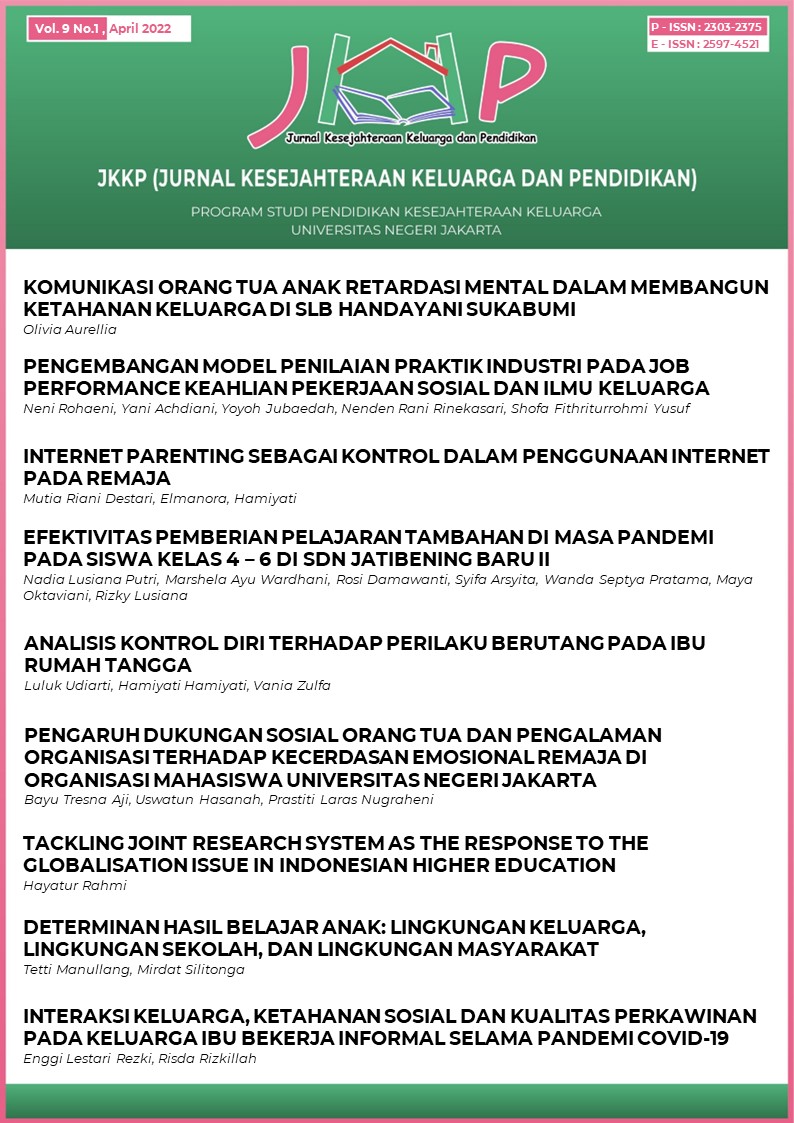PENGEMBANGAN MODEL PENILAIAN PRAKTIK INDUSTRI PADA JOB PERFORMANCE KEAHLIAN PEKERJAAN SOSIAL DAN ILMU KELUARGA
DOI:
https://doi.org/10.21009/JKKP.091.02Keywords:
assessment model, family sciences, industrial practice, job performance, social workAbstract
This research is motivated by the unavailability of industrial practice assessment instruments on job performance of social work and family science skills by standard demands in social institutions and government agencies. This causes the competence of students when carrying out industrial practices cannot be assessed properly because there is no specific reference in assessing the ability of students. Developing this industrial practice assessment model, it is to clarify and facilitate the process of implementing the practice assessment, so that the implementation of industrial practice can be carried out properly. In addition, there is still a variety of assessment instruments used to assess student job performance in the implementation of Industrial Practice, so that guidance is needed by Standard Operating Procedures in Social Institutions and government agencies. This research aims to develop the Industrial Practice Assessment Model on Job Performance of Social Work and Family Science Expertise. Problem-solving is done using a Research and Development approach, through stages: (1) Preliminary Studies, (2) Model Development, and (3) Model Validation. Industrial Practice Assessment Model on Job Performance competence of social work and family science expertise produced has the advantage of having gone through the stages of needs identification, theoretical analysis, and validation tests through expert judgment practitioners from social institutions and government institutions. The results of validation of industrial practice assessment tools that have been designed are categorized as "Very feasible" so that the assessment tool can be implemented on the implementation of Industrial Practice in social institutions and government agencies.
Abstrak
Penelitian ini dilatarbelakangi oleh belum tersedianya instrument penilaian praktik industri pada job performance keahlian pekerjaan sosial dan ilmu keluarga yang sesuai dengan tuntutan standar di lembaga sosial dan lembaga pemerintah. Hal ini menyebabkan kompetensi mahasiswa saat melaksanakan praktik industri tidak dapat dinilai dengan baik karena belum ada acuan khusus dalam menilai kemampuan peserta didik. Dengan dikembangkan model penilaian praktik industri ini adalah diharapkan dapat memperjelas dan memudahkan dalam proses pelaksanaan penilaian praktik, sehingga pelaksanaan praktik industri dapat dilaksanakan dengan baik. Di samping itu, masih beragamnya instrumen penilaian yang digunakan untuk menilai job performance mahasiswa pada pelaksanaan praktik industri, sehingga diperlukan panduan penilaian yang sesuai standar operasional prosedur di lembaga sosial dan lembaga pemerintah. Penelitian ini bertujuan mengembangkan model penilaian praktik industri pada job performance keahlian pekerjaan sosial dan ilmu keluarga. Pemecahan masalah dilakukan dengan menggunakan pendekatan research and development, melalui tahapan: (1) studi pendahuluan, (2) pengembangan model dan (3) validasi model. Model penilaian praktik industri pada job performance kompetensi keahlian pekerjaan sosial dan ilmu keluarga yang dihasilkan memiliki keunggulan karena telah melalui tahapan identifikasi kebutuhan, analisis teoritis dan uji validasi melalui expert judgement praktisi dari lembaga sosial dan lembaga pemerintah. Hasil validasi alat penilaian praktik industri yang telah dirancang dikategorikan “sangat layak”. Sehingga Model penilaian praktik industri pada job performance kompetensi keahlian pekerjaan sosial dan ilmu keluarga ini dapat diimplementasikan pada pelaksanaan praktik industri di lembaga sosial dan lembaga pemerintah.
Downloads
Published
Issue
Section
License
Authors who publish with this Journal agree to the following terms:
- Author retain copyright and grant the journal right of first publication with the work simultaneously licensed under a creative commons attribution licensethat allow others to share the work within an acknowledgement of the work’s authorship and initial publication of this journal.
- Authors are able to enter into separate, additional contractual arrangementfor the non-exclusive distribution of the journal’s published version of the work (e.g. acknowledgement of its initial publication in this journal).
- Authors are permitted and encouraged to post their work online(e.g. in institutional repositories or on their websites) prior to and during the submission process, as it can lead to productive exchanges, as well as earlier and greater citation of published works.
Users/public use of this website will be licensed to CC BY SA
![]()







